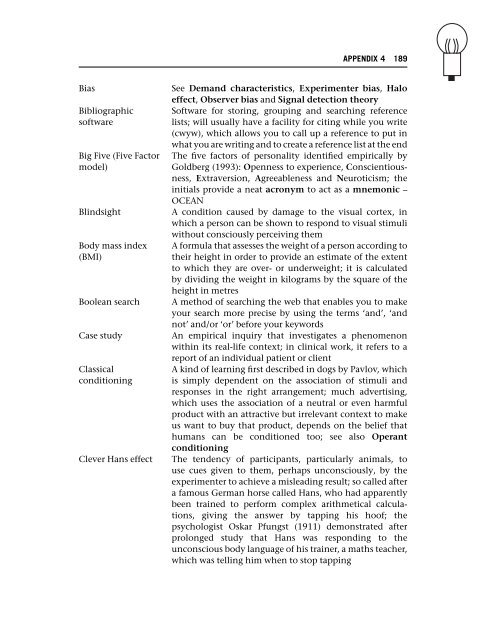Psychology - Forgot your username
Psychology - Forgot your username
Psychology - Forgot your username
Create successful ePaper yourself
Turn your PDF publications into a flip-book with our unique Google optimized e-Paper software.
APPENDIX 4 189<br />
Bias<br />
See Demand characteristics, Experimenter bias, Halo<br />
effect, Observer bias and Signal detection theory<br />
Bibliographic Software for storing, grouping and searching reference<br />
software lists; will usually have a facility for citing while you write<br />
(cwyw), which allows you to call up a reference to put in<br />
what you are writing and to create a reference list at the end<br />
Big Five (Five Factor The five factors of personality identified empirically by<br />
model) Goldberg (1993): Openness to experience, Conscientiousness,<br />
Extraversion, Agreeableness and Neuroticism; the<br />
initials provide a neat acronym to act as a mnemonic –<br />
OCEAN<br />
Blindsight<br />
A condition caused by damage to the visual cortex, in<br />
which a person can be shown to respond to visual stimuli<br />
without consciously perceiving them<br />
Body mass index A formula that assesses the weight of a person according to<br />
(BMI) their height in order to provide an estimate of the extent<br />
to which they are over- or underweight; it is calculated<br />
by dividing the weight in kilograms by the square of the<br />
height in metres<br />
Boolean search A method of searching the web that enables you to make<br />
<strong>your</strong> search more precise by using the terms ‘and’, ‘and<br />
not’ and/or ‘or’ before <strong>your</strong> keywords<br />
Case study<br />
An empirical inquiry that investigates a phenomenon<br />
within its real-life context; in clinical work, it refers to a<br />
report of an individual patient or client<br />
Classical<br />
A kind of learning first described in dogs by Pavlov, which<br />
conditioning is simply dependent on the association of stimuli and<br />
responses in the right arrangement; much advertising,<br />
which uses the association of a neutral or even harmful<br />
product with an attractive but irrelevant context to make<br />
us want to buy that product, depends on the belief that<br />
humans can be conditioned too; see also Operant<br />
conditioning<br />
Clever Hans effect The tendency of participants, particularly animals, to<br />
use cues given to them, perhaps unconsciously, by the<br />
experimenter to achieve a misleading result; so called after<br />
a famous German horse called Hans, who had apparently<br />
been trained to perform complex arithmetical calculations,<br />
giving the answer by tapping his hoof; the<br />
psychologist Oskar Pfungst (1911) demonstrated after<br />
prolonged study that Hans was responding to the<br />
unconscious body language of his trainer, a maths teacher,<br />
which was telling him when to stop tapping






